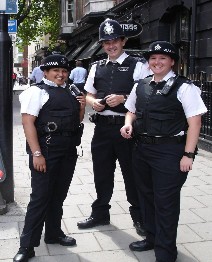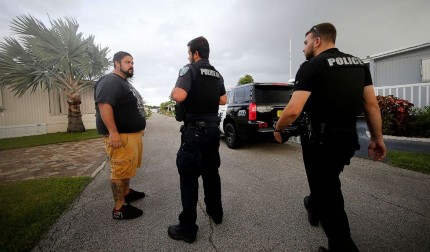| ||||||||||||||||||||||||||||||||||||||||||||||||||||||||||||||||||||||||||||||||||||||||||||||||||||||||||||||||||||||||||||||||||||||||||||||||||||||||
|
|
| |||||||||||||||||||||||||||||||||||||||||||||||||||||||||||||||||||||||||||||||||||||||||||||||||||||||||||||||||||||||||||||||||||||||||||||||||||||||
|
ТЕМА 7. Права и обязанности сотрудников милиции/полицииUnit 7
Duties and Rights of Militia/Police Officers
Law-Enforcement Activity
Law enforcement is the activity of officers of some government bodies acting in an organized manner to enforce the law by investigating criminal offences, detecting, locating, apprehending, punishing and rehabilitating (re-educating) people who violate the rules and norms of the society. Most law enforcement is conducted by law enforcement agencies. They are typically limited to operating within a specified jurisdiction. Every country has its law enforcement agencies, but there are also international bodies, which operate in different countries and across state borders, for example, Interpol. At the national level law-enforcement agencies may include police/militia agencies, investigative bodies, forensic examination agencies and agencies which prosecute criminal acts, the justice system (courts), the penitentiary system, national security bodies, tax and customs agencies, etc. These bodies may operate both independently and collectively. Throughout the world, law enforcement activities are mainly associated with maintenance of law and order and combating crime. The public order duties of law enforcement agencies include directing traffic and providing safety on the roads, patrolling streets, finding lost people, giving first aid to accident victims, settling quarrels, preventing juvenile delinquency and administrative offences. The crime-fighting function is associated with crime investigation and solution; observation of a crime scene; identification, detection, location and apprehension (arresting) of suspects and bringing them to justice; escorting detainees and convicts; execution of punishments. Besides responsibilities law enforcement officers have some special powers. They can check passports, identity papers, driver’s licenses and other documents; stop and examine vehicles; enter buildings and houses; interview witnesses; interrogate, photograph and fingerprint suspects; collect evidence, etc. Law enforcers may also use physical force, special weapons and firearms, though they may only be used under specific circumstances outlined by the law. Many law enforcement agencies are police or internal affairs agencies which have their specific structure and organization in different countries.
A Exercise 1. Give the English for: сопровождать заключенных и задержанных, защищать собственность, предупреждать преступность, государственная автомобильная инспекция, поддерживать правопорядок, оказывать помощь пострадавшим от несчастного случая, возбудить судебное преследование, снимать отпечатки пальцев у подозреваемых, главная цель правоохранительных органов, приказывать людям появиться в полицейском участке, главное управление уголовного розыска.
Exercise 2. Match English and Russian equivalents:
Exercise 3. Complete the sentences: 1) Policemen are to be seen in… 2) The Militia consists of forces such as… 3) The policemen are often called to… 4) The Criminal Militia consists of… 5) The Militia of Public Safety consists of… 6) The rights of the police are… 7) The crime-fighting function of the police includes… 8) A law enforcement agency means… 9) Among the public order duties one could mention…
Exercise 4. Agree or disagree: 1) A law enforcement agency means any state body which is responsible for enforcing only local laws and initiating criminal prosecutions. 2) Under the law, the central objective of law enforcement agencies is to provide security. 3) Policemen are to be seen in towns, villages and cities imposing fines. 4) The policemen are often called to settle quarrels, find lost people or aid accident victims. 5) The crime-fighting function of the police includes arresting of criminals. 6) The militia forces of the Republic of Belarus have similar functions and rights. 7) The Criminal Militia consists of the State Auto-Inspection, the Juvenile Inspection, the Service of Divisional Inspectors of Militia and other units. 8) The duties of the Militia of Public Safety are maintenance of public peace and order, crime prevention and traffic regulation. 9) The militiamen are often called to give first aid in hospitals.
Exercise 5. Answer the questions: 1) What does a law enforcement agency mean? 2) What is the central objective of law enforcement agencies? 3) What problems have policemen to solve? 4) What does the crime-fighting function of the police include? 5) What are the rights of the police? 6) What units does the Militia of the Republic of Belarus include? 7) What departments does the Criminal Militia consist of? 8) What are the main duties of the Criminal Militia? 9) What departments does the Militia of Public Safety consist of? 10) What are the main duties of the Militia of Public Safety?
B
Exercise 1. Translate the sentences paying attention to the use of the Perfect Tense: 1) The military organizations has historically policed the countryside, as police forces were initially created in urban settings. 2) Citizens of Great Britain have traditionally believed that the existence of a national police force would concentrate too much power in the hands of its directors. 3) When the police believe that someone has committed a crime, the police arrest them, take them to the police station and ask them questions. 4) Over the years, militia agencies have taken primary responsibility for preventing crime. 5) The police service in London have classified the offences. 6) Media has led to growing of trust between the police and the populations. 7) Police work has developed considerably from what it was centuries ago.
Exercise 2. Use the verbs in brackets in the Past Perfect Tense (Active Voice). Translate the sentences into Russian: 1) The militiaman (to catch) a dangerous criminal. 2) The Minister of Internal Affairs (to appoint) a new chief of the criminal militia. 3) The policeman not (to impose) a fine on the violator. 4) The officers of the militia of public safety (to prevent) the crime, when found the suspect. 5) The central department of criminal militia (to define) the principal goals of this investigation. 6) State Auto-Inspection patrol not (to block) the central street. Exercise 3. Use the verbs in brackets in the corresponding Perfect Tense (Active Voice). Translate the sentences into Russian: 1) Research evidence (to show) that the criminal is guilty before he is sentenced. 2) There (to be) an increasing tension between the police officers and organized criminals by the beginning of the operation. 3) The police (to perform) the duties which the law assign to them before committing a crime. 4) The prevention of international crime (to became) the principal task of the police forces around the world. 5) The authority extends to the detention of people who (to commit) a crime. 6) Investigators (to solve) the bank robbery case by the end of last month. 7) Criminologists (to collect) the evidence when the criminal was caught C
Exercise 1. Read and translate the text:
The British Police
Firstly, Britain has no national police force. Instead, there is a separate police force for each of 52 areas into which the country is divided. Each has a police authority – a committee of a local council.
Secondly, in most countries the police carry guns. The British police generally do not carry firearms, except in Northern Ireland. Only a few police are regularly armed – for example, those who guard politicians and diplomats or who patrol airports. In certain circumstances specially trained police officers can be armed, but only with the signed permission of a magistrate.
All members of the police must have gained a certain level of academic qualifications at school and undergone a period of intensive training. Like the army, there are a number of ranks: after the Chief Constable comes the Assistant Chief Constable, Chief Superintendent, Chief Inspector, Inspector, Sergeant and Constable. Women make about 10 per cent of the police force. The police are helped by a number of Special Constables – members of the public who work for the police voluntarily for a few hours a week. Exercise 2. Read and translate the text: The History of Miranda Warning
The United States Supreme Court ruled that the confession could not be used as evidence of Mr. Miranda's guilt because he was not fully advised on his legal rights, which included the right to have his attorney present. The Fifth Amendment to the United States Constitution states that no person can be deprived of life, liberty, or property, without due process of law. To ensure that other accused criminals are made aware of their constitutional rights, The Supreme Court ruled that a suspect who is taken into custody and interrogated must receive a warning of the following rights: the right to remain silent, that anything he says can be used against him in a court of law, that he has a right of the presence of an attorney, and that if he can not afford an attorney, one will be appointed for him prior to any questioning if he so desires. The "Miranda warning" is now applied by law officers throughout the United States as a result of this ruling. Exercise 3. Read and translate the text:
Miranda Warning
D
Duties and Rights of Militia/Police Officers
| ||||||||||||||||||||||||||||||||||||||||||||||||||||||||||||||||||||||||||||||||||||||||||||||||||||||||||||||||||||||||||||||||||||||||||||||||||||||||
|
| ||||||||||||||||||||||||||||||||||||||||||||||||||||||||||||||||||||||||||||||||||||||||||||||||||||||||||||||||||||||||||||||||||||||||||||||||||||||||
| © Академия Министерства внутренних дел Республики Беларусь Электронный учебно-методический комплекс | ||||||||||||||||||||||||||||||||||||||||||||||||||||||||||||||||||||||||||||||||||||||||||||||||||||||||||||||||||||||||||||||||||||||||||||||||||||||||

 The British police officer – sometimes called the “bobby” after Sir Robert Peel, the founder of the police force – is a well-known figure to anyone who has visited Britain or who has seen British films. Policemen are to be seen in towns and cities keeping law and order, either walking in the streets or driving in cars (known as panda cars because of their distinctive markings). Few people realize, however, that the police in Britain are organized very differently from many other countries.
The British police officer – sometimes called the “bobby” after Sir Robert Peel, the founder of the police force – is a well-known figure to anyone who has visited Britain or who has seen British films. Policemen are to be seen in towns and cities keeping law and order, either walking in the streets or driving in cars (known as panda cars because of their distinctive markings). Few people realize, however, that the police in Britain are organized very differently from many other countries. "You have the right to remain silent; anything you say can be used against you....", these are the words of the Miranda warning which was created as a result of 1966 United States Supreme Court case, Miranda v. Arizona. It began when Ernesto Miranda was arrested at his home and taken into custody to the police station, where he was identified by a witness as the man who had kidnapped and raped a woman. Police officers took Mr. Miranda into an interrogation room and two hours later emerged with a written confession signed by Mr. Miranda that also stated that the confession was made voluntarily and with full knowledge of his legal rights. The officers, however, failed to advise Mr. Miranda that he had a right to have an attorney present.
"You have the right to remain silent; anything you say can be used against you....", these are the words of the Miranda warning which was created as a result of 1966 United States Supreme Court case, Miranda v. Arizona. It began when Ernesto Miranda was arrested at his home and taken into custody to the police station, where he was identified by a witness as the man who had kidnapped and raped a woman. Police officers took Mr. Miranda into an interrogation room and two hours later emerged with a written confession signed by Mr. Miranda that also stated that the confession was made voluntarily and with full knowledge of his legal rights. The officers, however, failed to advise Mr. Miranda that he had a right to have an attorney present.